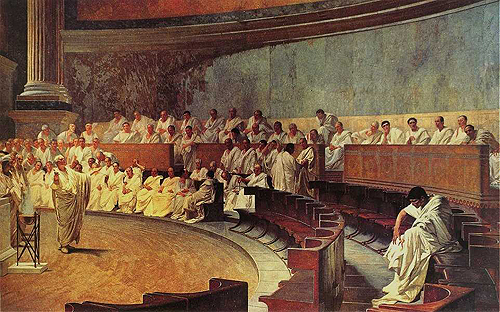Roman Political Invective
Today, a look at Roman mudslinging. The Honors College at the University of Houston presents this program about the machines that make our civilization run, and the people whose ingenuity created them.
During a political campaign season, inventive minds work overtime — and in ways we might come to dread. With the approaching election, operatives will find ways of exploiting the tiniest flaw in their opponents. And in today's 24/7 news cycle, there will be nowhere to hide from all the mudslinging. It's no wonder they say a politician is a person who divides his time between running for office and running for cover.
But today's candidates should thank their lucky stars they're not running for office in ancient Rome. In the days when Rome was still a Republic, elections were held every year for the most important public offices. Honor and personal reputation were key factors in elections then as now. So dishonoringyour opponent or wrecking his reputation were obvious moves to make. The favorite venues for such tactics were the Senate, the people's assembly, and the law courts in the Roman Forum. There were no rules about relevance when talking about the accused, and little protection against slander or libel. So you didn't have to prove your case to inflict serious damage to your enemy's reputation.
Favorite accusations concerned insatiable greed; drunkenness and gluttony, even public vomiting. Also, ignoble birth, connections to a dishonorable trade or consorting with low-life rabble, especially pimps, thugs, and actors. They alleged impiety and sacrilege; effeminacy; sexual deviance, including incest; murder, even accusations of killing wives or family members. Making fun of a physical defect was also considered fair play. There were devastating broadsides, like calling someone "a measureless abyss or whirlpool of all vices and indecencies."
But the best Roman orators were careful not to wield such accusations bluntly. The true art of invective is to show yourself morally superior, even as you say outrageous things about your enemy. A favorite technique for this was insinuation or innuendo. Here's an example. The famous orator Cicero became a vehement enemy of Mark Antony, a follower of Julius Caesar. In a scathing speech after Caesar's assassination, Cicero sought to destroy Mark Antony's reputation. He danced around rumors of a scandalous love affair with another prominent man when Mark Antony was young.

Cicero denounces Catiline, fresco by Cesare Maccari (1840-1919).
Listen to how carefully Cicero lands his blow: "But let us not go into these acts of fornication and scandal. There are some things I cannot respectably mention," Cicero says. But then he adds, addressing Antony, "For this reason, you have much greater freedom, since you won't hear from a decent enemy the kinds of things you've allowed to be done to yourself."
This was the skillful, hardball rhetoric of the last generation of Rome's Republic. It was at its height right as Roman society was falling apart. With the coming of the emperors, political rhetoric lost its edge and purpose. Public discourse became mere flattery of the emperor. So we should remember a degree of verbal abuse is a sign of political freedom. And this is a fine old tradition. Let it be at least skillful and witty, as befits free and dignified people.
I'm Richard Armstrong, at the University of Houston, where we're interested in the way inventive minds work.
Arena, Valentina. "Roman Oratorical Invective," in A Companion to Roman Rhetoric, edited by W. Dominik and J. Hall, Oxford: Blackwell Publishing, 2007, chapter 12.
Corbeill, Anthony. Controlling Laughter: Political Humor in the Late Roman Republic, Princeton: Princeton UP, 1996.
Gruen, Erich. The Last Generation of the Roman Republic, Berkeley: U California P. See especially chapters 7 and 8.
For Cicero's extended attack on Mark Anthony, see Cicero: Philippics, edited and translated by D. R. Shackleton Bailey, Chapel Hill: U North Carolina P.
For a look at British rhetoric, see Greg Knight, MP, Honourable Insults: A Century of Political Invective, London: Arrow Books, 1990.
The old rhetorical trick of talking about something by saying you're not going to talk about it is known as preterition (also apophasis or occultatio). Example, "Let us not talk about his drunkenness and profligate ways; what he does on his own time is, after all, his business."
Image courtesy of Wikimedia commons, a public domain image.